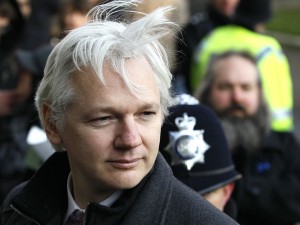LONDON – WikiLeaks founder Julian Assange on Tuesday walked into Ecuador’s embassy in London and applied for political asylum in a sensational bid to avoid extradition to Sweden over alleged sex crimes.
The former computer hacker, who last week exhausted all his legal options in Britain to fight extradition, was holed up at the embassy in central London while Quito examined the request, officials said.
Britain’s Foreign Office said Assange was “beyond the reach of the police” because he was on diplomatic territory, but stressed it would seek to work with the Ecuadorian authorities “to resolve this situation as soon as possible.”
Assange will remain at the embassy under the protection of the Ecuadorian government while his application is considered.
“The decision to consider Mr Assange’s application for protective asylum should in no way be interpreted as the Government of Ecuador interfering in the judicial processes of either the United Kingdom or Sweden,” the embassy said in a statement.
Prime Minister Julia Gillard said Tuesday that Australia will continue to offer consular assistance to Assange.
“Australia will continue to support Mr. Assange just as we do support any Australian overseas who faces legal difficulties or dilemmas,” Gillard told reporters after a Group of 20 summit in Mexico.
Assange confirmed in a statement he was seeking “diplomatic sanctuary and political asylum” and expressed his gratitude to the Ecuadorian ambassador and government for considering the request.
In Quito, Foreign Minister Ricardo Patino said: “Julian Assange has requested political asylum at the diplomatic mission of Ecuador in London.
“The government is examining the request.”
The embassy later confirmed it would be seeking the views of Britain, Sweden and the United States in order to make sure it complied with international law.
Assange has always maintained that the moves to extradite him to Sweden for questioning over allegations of rape and sexual assault are politically motivated and that the real aim is for him to handed over to US authorities.
The silver-haired 40-year-old Australian’s website enraged Washington by releasing a flood of classified US information about the wars in Iraq and Afghanistan.
It also published more than 250,000 classified US diplomatic cables, revealing often candid assessments of a huge range of issues as well as the views of other governments.
Ecuador offered Assange residency in 2010, with the government saying at the time it wanted to invite Assange to speak in Ecuador after expressing concern about some of the alleged US activities revealed by Wikileaks. Assange interviewed Ecuador’s President Rafael Correa for his talk show aired on the Russian international television station RT in April.
The embassy is in the upmarket west London district of Knightsbridge, near to Harrods department store and in the same mansion block as the the Colombian embassy.
A supporter of Assange, Jemima Khan, the former wife of Pakistan politician Imran Khan, said on Twitter she was “as surprised as anyone” by the move and had expected him to face the allegations in Sweden.
The request for asylum came after Britain’s Supreme Court last week rejected an application by Assange to reopen his appeal against extradition.
The decision closed Assange’s last legal avenue in Britain, although he could still take his case to the European Court of Human Rights (ECHR) in Strasbourg.
The court said extradition proceedings could not begin for two weeks.
Assange’s lawyers have until June 28 to apply to the Strasbourg court to consider his case on the basis that he has not had a fair hearing from the British courts.
In the United States, soldier Bradley Manning is facing trial over accusations that he handed a huge cache of documents to WikiLeaks.
